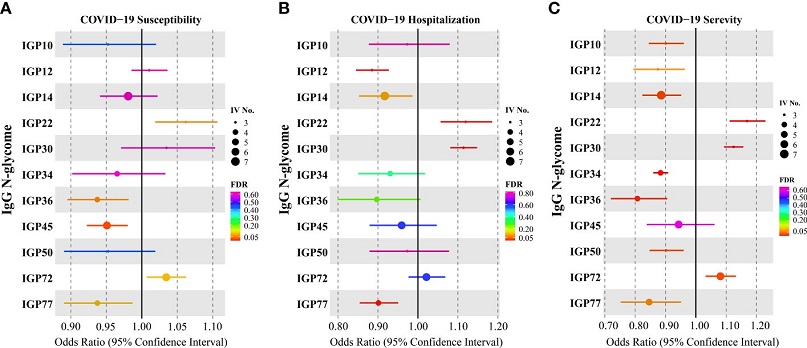COVID-19 News: Chinese Scientists Uncover How Genetically Elevated IgG N-Glycosylation Traits Impact COVID-19 Outcomes
Thailand Medical News Team Aug 21, 2023 1 year, 7 months, 4 weeks, 10 hours, 16 minutes ago
COVID-19 News: The ongoing COVID-19 pandemic has sparked global attention due to its impact on human health. As researchers continue to explore ways to understand and manage the disease, new evidence has emerged suggesting that the body's immune response plays a significant role in determining the severity of infection. A study conducted by researchers from Sichuan University in Chengdu, China, has shed light on the potential connection between specific genetic traits related to immune response and the diverse outcomes observed in COVID-19 cases.
 Causal effects for IgG N-glycosylation traits on COVID-19 outcomes. (A) Results of the Mendelian randomization (MR) analysis derived from the inverse-variance weighted (IVW) testing the effect of genetically determined IgG N-glycosylation traits on (A) COVID-19 susceptibility, hospitalization (B) and severity (C).
Understanding the Immune Response in COVID-19
Causal effects for IgG N-glycosylation traits on COVID-19 outcomes. (A) Results of the Mendelian randomization (MR) analysis derived from the inverse-variance weighted (IVW) testing the effect of genetically determined IgG N-glycosylation traits on (A) COVID-19 susceptibility, hospitalization (B) and severity (C).
Understanding the Immune Response in COVID-19
COVID-19 is caused by the SARS-CoV-2 virus and leads to a wide range of symptoms and disease severity among individuals. Some people experience mild symptoms or remain asymptomatic, while others face severe respiratory issues that can even lead to death. The variation in outcomes has prompted scientists to investigate what factors might contribute to this heterogeneity in response.
Various risk factors, such as age, obesity, and underlying chronic conditions, have been associated with an increased likelihood of severe COVID-19. It's also becoming clear that genetic factors play a role in influencing an individual's susceptibility to infection and the severity of symptoms. The immune system's response, including the production of antibodies like immunoglobulin G (IgG), appears to be a key player in determining COVID-19 outcomes.
The Role of IgG and N-Glycosylation in Immunity
Immunoglobulin G (IgG) is a type of antibody that is crucial for the body's immune response against infections, including viral infections like COVID-19. IgG antibodies help identify and neutralize foreign invaders, preventing them from causing harm. The specific structure of IgG molecules, particularly the arrangement of sugars called glycans on their surface, can influence their effectiveness in recognizing and neutralizing viruses.
Previous studies and
COVID-19 News reports have indicated that the pattern of glycans on IgG molecules, referred to as N-glycosylation, might be linked to the severity of COVID-19. Some glycans are associated with pro-inflammatory responses, while others are related to anti-inflammatory effects. However, whether changes in these glycans are directly causing the varying COVID-19 outcomes or if they are merely associated remains unclear.
Investigating the Causal Link Using Mendelian Randomization
To better understand the relationship between IgG N-glycosylation and COVID-19 outcomes, the study team conducted a study using a method called Mendelian randomization (MR). This technique uses genetic variations that individuals inherit from their parents to
determine whether a particular factor—in this case, IgG N-glycosylation - causes changes in COVID-19 susceptibility and severity.
The study analyzed genetic data from genome-wide association studies (GWAS) and used various statistical methods to identify causal associations. These methods included inverse-variance weighting, MR Egger, and weighted median. The researchers also employed additional tests to ensure the reliability of their findings.
Key Findings and Implications
The study yielded significant results indicating a causal relationship between certain genetically predicted IgG N-glycosylation traits and COVID-19 outcomes.
Specifically:
-An increase in a particular IgG N-glycan trait (IGP45) was associated with a reduced risk of COVID-19 susceptibility.
-Other IgG N-glycan traits (IGP22 and IGP30) were linked to a higher risk of COVID-19 hospitalization and severity.
-Several IgG N-glycosylation traits were found to be causally associated with a decreased risk of COVID-19 hospitalization and severity.
These findings suggest that variations in IgG N-glycosylation patterns can impact the body's immune response to COVID-19.
However, it's important to note that this study has limitations, such as its focus on individuals of European ancestry and its reliance on summary-level data. Further research is needed to validate and explore the mechanisms underlying these associations.
Unpacking the Results
The study's results highlight the complex interplay between genetic factors, immune response, and COVID-19 outcomes. While certain IgG N-glycosylation traits were associated with a protective effect against COVID-19 susceptibility, others seemed to contribute to higher risks of severe outcomes. These findings hint at the potential for targeted interventions that modulate IgG N-glycosylation levels to improve COVID-19 outcomes.
It's important to emphasize that this study is just one piece of the puzzle. COVID-19 is a multifaceted disease influenced by a wide range of factors, including genetics, pre-existing health conditions, and overall immune health. Continued research into the causal mechanisms underlying COVID-19 outcomes will provide crucial insights for developing effective treatments and preventive strategies
.
In conclusion, this study from Sichuan University underscores the connection between genetically determined IgG N-glycosylation traits and the diverse outcomes observed in COVID-19 cases. By utilizing Mendelian randomization, the researchers were able to establish a causal link between specific IgG N-glycan patterns and COVID-19 susceptibility and severity. These findings open up exciting avenues for future research aimed at leveraging these genetic traits to enhance our ability to manage and treat COVID-19 effectively.
The study findings were published in the peer reviewed journal: Frontiers In Immunology.
https://www.frontiersin.org/articles/10.3389/fimmu.2023.1217444/full
For the latest
COVID-19 News, keep on logging to Thailand Medical News.
